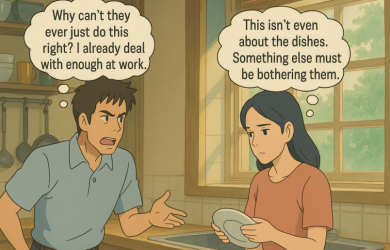15 Ways to Let Go of Anger and Resentment in a Relationship

Unlock Daily 30-Sec Tips for a Happier Relationship
👉 Subscribe FREEKey Takeaways
Marriage.com AI Quick Summary
Anger is a normal, natural emotion. It alerts us to a situation that we perceive as unjust, unfair, and perhaps out of our control. We can feel anger when something makes us feel inadequate, vulnerable, at risk or helpless.
Feeling angry is something we do in the present, but it can be related to an event that happened long ago. When we carry our anger around, it can have a corrosive effect on us and our interpersonal relationships.
How to let go of resentment and anger? Let’s examine these emotions and look at ways that we can both recognize why we are angry and find strategies to let it go.
What is anger in a relationship?
We all feel anger. It’s a natural emotion that we all feel because of different triggers. It could be because of betrayal, frustration, or due to pain, either physical or emotional.
Everyone may express their anger, and if you could do this healthily, you avoid creating resentment overtime. If a person doesn’t express their anger, it causes so much negativity in a person’s life.
Stress, physical signs, and even resentment are some things that you can feel if you don’t know how to properly express your anger.
If, for some reason, a person’s anger can’t be expressed, it doesn’t go away. It actually turns into resentment. Like a seed, if you plant resentment, it grows until you can no longer take it, and it explodes.
What is resentment in a relationship?
Resentment in a relationship is a feeling of deep-seated and lingering anger, bitterness, and even disappointment to your partner that arises from a perceived neglect and mistreatment.
Both resentment and anger can both be toxic for a relationship. A person who feels resentment towards their partner will not be happy as they constantly have this heavy feeling of mistrust, anger, and distance between the two of them. In fact, it grows overtime.
Sadly, this affects both the couple in the relationship. It prevents their relationship from growing and their hearts from flourishing.
What is the root cause of anger and resentment?
There is no one definite list that causes both anger and resentment. It’s different in every situation, but they share some common factors.
1. Unmet expectations or disappointment
It’s one of the most common reasons we feel resentment and anger. It’s all because of disappointments. Even if your partner says sorry, or makes it up to you, there’s already that pain of your expectations not being fulfilled. This may cause anger, and overtime, resentment.
Maggie Martinez, LCSW, says
It is important to be aware of what your expectations are and whether you have been clear about communicating them.
Related Reading: How to Deal With Disappointment in Relationships: 10 Ways
2. Perceived injustice
Another cause of anger and resentment is a perceived injustice or unfairness. The feeling of being treated poorly or being lied to can definitely create a deep feeling of resentment not only to your partner but also to the people involved.
3. Stress
Stressful situations, including financial matters, are also common reasons a person could feel resentment.
When a person is dealing with external pressures such as financial difficulties or work-related stress, they may be more likely to become resentful or angry in their relationships as they feel like they are the only ones putting effort.
Maggie Martinez adds,
They may also feel that their partner isn’t noticing that they are stressed or financially struggling, which can lead to more frustration.
Related Reading: 20 Causes of Stress in Relationships and Its Effects
4. Trauma
That’s right, traumatic experiences or hurt can contribute to anger and resentment. Past mistakes, lies, and infidelity could all cause resentment. It’s one of the hardest to deal with.
There could be many reasons people feel anger and resentment. It also depends on how one perceives these situations and how they react to it.
What is the difference between anger and resentment?
These are related emotions, but anger is something you feel mostly in the present, whereas resentment is felt about something that happened in the past.
What is the difference between anger and resentment?
Resentment is anger from the past carried into the future, like a heavy piece of luggage that weighs you down constantly.
When you reflect on a long-ago injustice and you start feeling a flood of negativity, that is resentment. People can hang on to resentments for decades. We all know of someone, perhaps a family or a celebrity, who has had an inter-family riff which has split them apart for years, right?
Long-standing resentment is hurtful to the person harboring it, hence the saying ““Holding on to a resentment is like drinking poison and waiting for the other person to die.”
15 ways to let go of anger and resentment in a relationship
The truth is, letting go of resentment is never easy. Over time, it becomes more painful, but you also feel like you can’t just throw this emotion away.
Getting angry and feeling resentment can be justifiable emotions. Do not feel badly about having these. It’s how you move forward with them that is important. Let’s see how to let go of anger and resentment.
Recognize that you are in control. Anger and resentment are strong feelings. We can often feel like they are controlling us. This is unhealthy, because it is giving away your agency.
It is helpful to remember that you are in the driver’s seat, and that you can control the way you react to outside forces, be they people or events.
Here is how to let go of resentment and anger:
1. Put a name on the ‘what’
Identify and name the reason that you are feeling angry or resentful. What is making you hurt or fearful? This shifts the focus from the anger to the source of the anger.
2. Be present with the anger and resentment
Just sit with it for a moment. Observe it. Allow it to exist. Tell yourself that you see it, you respect its right to be there.
Imagine it existing in its own space, with a protective wall all around it, allowing it to be there but not encroach on your well-being.
Related Reading: How Much Resentment do You Have Towards Your Partner?
3. Ask yourself if you have a role in this anger-producing situation
This will require brutal honesty, but it is helpful to examine if you may have contributed to these circumstances. Take responsibility.
Maggie Martinez comments,
When you take responsibility for what you have done, you can begin to fix what the core of the issue is.
4. Practice expressing things in a anger and resentment
- Reach out to your group of supportive friends and tell them what is making you angry.
- Journal your thoughts.
- Go out for a brisk walk or a workout at your gym or pool.
- Try a walk in the forest; it is difficult to hang on to resentments when you are surrounded by fresh air and beautiful nature.
- Get involved in social justice activism, where you are working towards a better world with other like-minded people.
5. Calm your mind
Replace angry thoughts with positive mantras. Practice some self-calming techniques, such as circle breathing, meditation, yoga, mindfulness, and staying in the present. Go have a relaxing massage, a cup of herbal tea.
Stay away from energy drinks and caffeine as these will raise your heart rate which in turn can make you jumpy and anxious.
6. Don’t get caught up in collective anger and resentment
If your work colleagues are constantly complaining about workplace conditions or how unfair the boss treats them, it can be tempting to join in.
Try to avoid this so that you can focus on how to effect positive change rather than just be drawn into the drama. It is much healthier for you to be the change leader than to just sit around expressing how unjust life is and how you can do nothing about it.
7. Change your perspective towards the person
If you can, try to change your perspective towards the person who caused you to feel resentment. It’s another great way to learn how to let go of resentment because you recognize no one is perfect, all of us have our own struggles in life, and we all make mistakes.
Once you’ve understood that, you’ll feel empathy and see that your partner has many other good qualities, and the source of your resentment doesn’t define this person or your future together. This also opens your heart to feel forgiveness.
Related Reading: How Perspective Helps Your Relationship Grow
8. Always be grateful
Hearing people say to just let go of resentment may seem straightforward and definitely difficult. However, if you try to practice gratitude, then it could help – a lot.
You’re with this person today because you still believe there’s a chance for your relationship. From there, if you can, list all the things that you are grateful for.
Is this person sweet, thoughtful, a good provider, a good father, maybe?
Try to see all the good sides and feel grateful for them. These steps allow us to realize that if we focus on the things that caused the resentment, then that is all that we would see.
9. Practice self-love
Dealing with anger and resentment can be stressful and tiring. Therefore, you should also practice self-love. Would you want to spend most of your time feeling that heavy burden in your chest?
Love yourself enough to actually want to let go. Love yourself to where you know you don’t deserve this negative emotion in your life. You can practice learning how to express your anger, or any other negative emotions so you can finally let them go.
Remember that your partner doesn’t know what you are feeling; only you can feel that heavy resentment.
Struggling with self-love and don’t know where to start? Try this 3 easy steps by Andrea Schulman, a well-known lifestyle coach:
10. Focus on your present
Learn how to let go of anger and resentment by living in the present. While we understand that resentment has its basis, we also know that it’s a lingering negative emotion.
You cannot fully enjoy your present moment if you still have that in your heart. You can’t see the good without having second thoughts, and you won’t be able to appreciate it if you always think about that past hurt.
Related Reading: 10 Ways of Being Present in a Relationship
11. Focus on self-care
If you have started practicing self-love to help you get rid of resentment, then it’s time to add self-care. Don’t wait until resentment shows signs physically, like stress and headaches.
Take care of yourself, find time to exercise, eat healthy food, go out, and find the things that make you happy, busy, and productive.
Soon, you’ll realize that the resentment that you’ve been holding has long been gone.
Related Reading: The 5 Pillars of Self-Care
12. Step into your partner’s shoes
We all make mistakes, right? Imagine making a mistake and you’re sorry about it, but your partner still has resentment in their heart? How would you feel?
Another effective way on how to get over anger and resentment is to put yourself in your partner’s shoes.
Sometimes, we cannot see the efforts of the person involved because of the hurt, and while you may have your reasons, this makes everything complicated. Soon, your partner, who’s been trying to make it up, might also harbor resentment towards you.
13. Communicate – what do you want or expect moving forward?
Once you have decided that it’s time to start resolving anger and resentment, then start with communication. We all know how effective this is when it comes to solving issues, right?
Talk with your partner. Talk about the underlying issue, be honest, and tell this person what you feel. Then, moving forward, talk about what you expect from each other.
Make things clear, and work on it instead of keeping resentments towards your partner.
14. Break up with the emotion
Do you know one of the most effective ways on how to get rid of resentment? Decide that you want to break up with this negative emotion. No matter what technique or program you take, if you don’t want to let it go, it won’t work.
Ultimately, it’s your decision that will have the final say whether or not you’ll continue this. Choose to let go, choose forgiveness, and happiness, not just for the person who gave you the ill feelings, but for yourself.
Related Reading: How to Break up With Someone You Love: 15 Breakup Tips to Follow
15. Seek counseling
Lastly, relationship counseling can also help so much. If you and your partner are both willing to work on your relationship but having a hard time, then learning how to get past anger and resentment with the help of a licensed professional is the best option.
Aside from fixing the relationship, they can also help in giving you skills that will help in future situations where resentment may start again.
Some more questions
In this section, we’ll explore some more strategies for letting go of anger and resentment in a relationship. We’ll address some common questions about forgiveness, communication, and self-care to help you move towards healing and growth.
-
How do you break the cycle of resentment and anger
Breaking the cycle of resentment and anger requires commitment.
You must first want to learn how to let resentment go, from there, have the willingness to work on oneself.
There are different strategies to break the cycle, including, but not limited to acknowledging and reflecting on your emotions, practicing forgiveness, learning how to communicate, practicing empathy, and seeking professional support if needed.
Remember that you also have to be patient and kind with yourself and your partner. Lastly, recognize that breaking the cycle takes time and effort, so don’t give up that easily.
-
How do you release built up resentment
Why is it so hard to let go of resentment and anger? Why do we let it stay in our hearts for so long?
Indeed, releasing built up resentment can be difficult, but not impossible.
It requires acceptance, effort, and finally, healing. To release resentment, you start with the steps on how you can deal with your lingering anger first.
Also, remember that practicing self-love and self-care can help. With time and effort, you can release negative emotions and move towards a more positive and fulfilling life.
Hold on to better things in life
When you feel deep anger and resentment, remember that you’re not only hurting your partner, but also yourself. It prevents you from enjoying your relationship and living a happy life.
With different techniques and help from professionals, you can learn how to let go of resentment and anger. It’s possible but will require effort.
Remember, let go of anger and resentment, it will serve you well. Put into practice the tips here and you will find yourself feeling lighter, happier and more positive, even when faced with difficult situations.
 Tips
Tips
Write your tip or submit a video tip
All tips are reviewed before the publishing.
Share this article on
Want to have a happier, healthier marriage?
If you feel disconnected or frustrated about the state of your marriage but want to avoid separation and/or divorce, the marriage.com course meant for married couples is an excellent resource to help you overcome the most challenging aspects of being married.
Recent Articles
Related Quizzes
Unlock Daily 30-Sec Tips for a Happier, Healthier Relationship
👉 Subscribe FREE on YouTube We'd love your feedback!
We'd love your feedback!
 Expert Q&A
Expert Q&A
Ask your question related to this topic & get the support you deserve from experts.



















 Thanks for your feedback!
Thanks for your feedback!